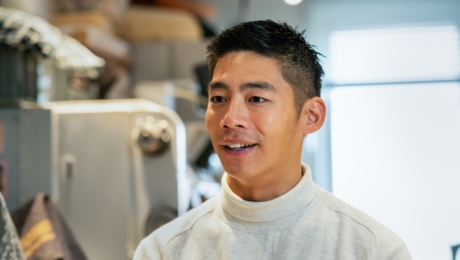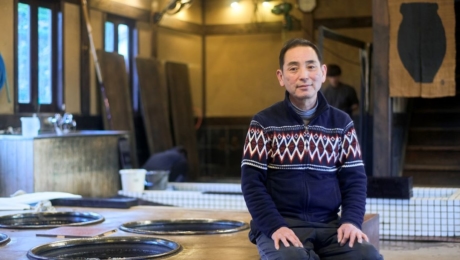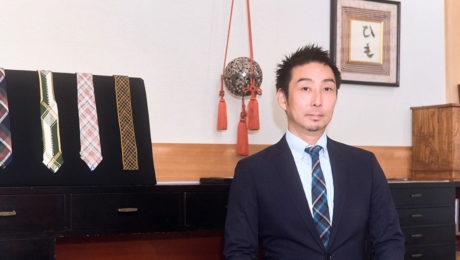![[The Next Generation] A Next-Gen Leader Driving Change at Tsuchiya Kaban Through Craft and Communication](https://en.edotokyokirari.jp/wp-content/uploads/20250916173055/16cc87d6f0026f86c0c908a2e475d90e.jpg)
![[The Next Generation] A Next-Gen Leader Driving Change at Tsuchiya Kaban Through Craft and Communication](https://en.edotokyokirari.jp/wp-content/uploads/20250916173112/dd73c513aa4b4c889467e76df16c82ac-750x750.jpg)
[The Next Generation] A Next-Gen Leader Driving Change at Tsuchiya Kaban Through Craft and Communication
2025.10.07
FASHIONFounded in 1965 as a specialist in randoseru traditional Japanese school bags, Tsuchiya Kaban has long been committed to craftsmanship. Ayumi Shimoda joined the company in 2019 with that same passion for making things by hand. Motivated by a deep commitment to the craft ofrandoseruand to a collaborative approach to production, she rose in just five years to become the youngest team leader overseeing school bag assembly. What new goals lie ahead for Shimoda, who has transformed the company’s production system through ongoing dialogue with her fellow artisans, in hopes of building an environment where craftspeople can take the lead in making better products?
At Tsuchiya Kaban,randoseruproduction is divided into several teams—cutting leather, crafting parts, assembling, finishing, and more. Shimoda was assigned to the shoulder strap production team when she first joined, and in the same year, she became team assistant, then team lead. In April 2024, she was promoted to lead three assembly teams. Her journey has been one of embracing tradition while striving to drive positive change across the entire team.
![[The Next Generation] A Next-Gen Leader Driving Change at Tsuchiya Kaban Through Craft and Communication](https://en.edotokyokirari.jp/wp-content/uploads/20250916173240/dc99fbb63de42f38904d8c5aefac18a5-1440x960.jpg)
What Shimoda values most is making things as a team. Upon becoming a leader, her first priority was revitalizing communication within the department.
“I began setting aside time each month for team-wide discussions. At first, the artisans seemed unsure, but over time I started hearing comments like, ‘That was really enjoyable’ and ‘It helped me see the meaning in my work.’ Now we’re seeing more interaction even beyond our teams, like with the parts assembly group, and it’s boosting everyone’s motivation.”
![[The Next Generation] A Next-Gen Leader Driving Change at Tsuchiya Kaban Through Craft and Communication](https://en.edotokyokirari.jp/wp-content/uploads/20250916173339/e8aed04e1c57ff9e8136d3d675ffb03c-1440x960.jpg)
Shimoda also rethought the production approach in preparation for peak manufacturing season. For example, she worked with the artisans to reduce physical distance within the workspace, minimizing the need for movement, and consolidated work from one-person-one-task to three tasks per person. These improvements led to increased efficiency and helped the team meet its annual production target. Streamlining the production system also lightened the physical strain on workers and improved product quality.
![[The Next Generation] A Next-Gen Leader Driving Change at Tsuchiya Kaban Through Craft and Communication](https://en.edotokyokirari.jp/wp-content/uploads/20250916173426/879b29032e250d94db87520cef57c8d2-1440x960.jpg)
As the market forrandoseruchanges due to factors like declining birthrates and the popularity of nylon backpacks, Shimoda believes, “There’s meaning in what we’ve built over time.” She emphasizes that passing on not only technical skills but also values and culture to the next generation is crucial.
“Fostering the next generation is a major challenge. I’d like to see more women—not just me—take on leadership roles going forward.”
Tsuchiya Kaban has long been committed to nurturing future artisans, proactively hiring newcomers and those with no prior experience. In the manufacturing department, team assignments are regularly rotated. By working across the nearly 300 steps involved inrandoseruproduction, employees are exposed to a wide range of techniques and perspectives, helping them grow their skills and confidence while encouraging personal development and new challenges.
![[The Next Generation] A Next-Gen Leader Driving Change at Tsuchiya Kaban Through Craft and Communication](https://en.edotokyokirari.jp/wp-content/uploads/20250916173534/3f8f6aa956658211a678345a8ef4c515-1440x960.jpg)
Previously, these team rotations occurred on an annual basis, but they are now adjusted based on individual growth. This allows each person to follow a more flexible, personalized career path. By appointing young talent like Shimoda to leadership positions, the company is building an environment where anyone, regardless of age or gender, can step up and take on challenges. As a result, a more open-minded, forward-looking spirit has begun to take root among the artisans.
Speaking about what makes Tsuchiya Kaban a rewarding workplace, Shimoda explains, “There’s a real sense of pride and affection for our products here. It’s a place where people can thrive in different areas. Of course, there’s always room for improvement. I’d like to find ways to better document our skills, which tend to be passed on verbally, and keep building a team culture where we can rely on one another.”
![[The Next Generation] A Next-Gen Leader Driving Change at Tsuchiya Kaban Through Craft and Communication](https://en.edotokyokirari.jp/wp-content/uploads/20250916173622/f19f4d249043b83c66c77cd609072001.jpg)
The Next Generation is a series spotlighting the young artisans and staff helping pass down traditional skills and know-how that have been nurtured in Tokyo across generations. The series explores what inspired them to choose this path, what their work entails, and what they envision for the future.






